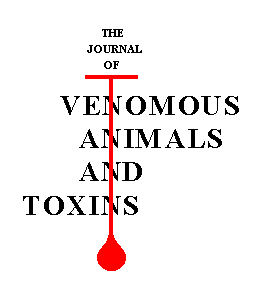Scorpion envenoming is a public health concern in northeastern Venezuela. Specimens of the genus Tityus are responsible for most of these. In experimental animals, Tityus venom produces histopathological changes in the skeletal muscle and pancreas, but its toxicity to the reproductive system has not been studied. The aim of this work is to describe the histopathological changes in testis and epididymis of albino mice induced by the administration of Tityus n. sp. venom. Sub-lethal doses of venom (3.75 mg/g mouse) were administered intramuscularly (IM) daily for 4 days. On the fifth day, the animals were sacrificed and the testes and epididymes were quickly removed and processed for light microscopy. The venom induced alterations in spermatogenesis. Sertoli cell vacuolation, immature germ cell shedding, spermatocyte arrest, and low sperm volume were observed in seminiferous tubules. Leydig cells were hardly affected. Vascular dilation and congestion were detected in the interstitial tissue. Immature germ cells were found in epididymal tubule lumina, but no abnormalities were observed in epididymal epithelial cells. These results show that Tityus n. sp. venom causes changes in mouse seminiferous epithelium, probably due to indirect action through the Sertoli cell.
Testis; Sertoli cell; epididymis; scorpion; venom; mouse; histopathology










